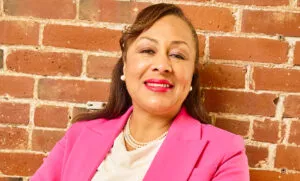Bridging Communication
Worcester State’s Speech-Language-Hearing Center serves the community with free, expert, compassionate services.
By Taryn Plumb ’04
Imagine knowing what you want to say but not being able to communicate it effectively. For those with speech and hearing disorders, it is a frustrating, daily ordeal.
For more than 35 years, the Speech-Language-Hearing Center (SLHC) at Worcester State has helped people across Central Massachusetts bridge communication barriers while also providing a rich training environment for future speech-language pathologists. In 2023, the SLHC provided 1,180 speech, language, or hearing visits to residents of the community.
Working in speech, language, and hearing “takes a compassionate heart, a person who wants to help other people,” said SLHC Director Andrea Quinn. “When you’re able to give someone back their ability to communicate or help somebody connect with their family when communication is a barrier, that’s completely rewarding.”
An extension of Worcester State’s speech-language pathology program, SLHC offers free services for all ages around receptive and expressive language, augmentative and alternative communication, hearing, fluency, aural rehabilitation, speech sound production, voice and resonance, and cognitive and social aspects of communication. It also has a full-time audiologist who provides free hearing evaluations to anyone in the community.
“The field is very expansive,” said Quinn. “Nobody knows what a speech-language pathologist does until they need us. We take communication for granted.”
Quinn explained that practitioners at the center may serve children with articulation disorders who can’t produce expected sounds. Or, someone may be on the autism spectrum and can’t communicate in traditional ways, so specialists help them develop verbal or non-verbal methods of interaction. “Sometimes we have to teach our families to not listen with their ears, but listen with their eyes,” said Quinn.
The SLHC also serves a large population experiencing aphasia (loss of ability to understand or express speech, usually caused by damage to the brain) as well as those with Alzheimer’s or people looking to improve their foreign accents or affirm their transgender voices.
Members of the community benefit from support groups, too, including one for aphasia, a disorder that can be a “devastating loss” for people who have communicated verbally their whole lives, Quinn pointed out.
“Our world moves fast,” she said. “A lot of times people feel left out, and so we provide a spot for them to not only work on their conversational skills but feel like they’re part of a group.”
The center benefits from—and also serves as a training ground for—students in Worcester State’s Speech-Language Pathology undergraduate and graduate programs. Students not only study hearing and speech science in the classroom, but provide direct care under the supervision of certified speech-language pathologists.
Graduate student Julienette Rivera ’22 said the clinical setting is the most enjoyable (and also challenging) element, as she can spend time with clients and focus on their unique needs. “It is the person sitting in front of you who trusts you to treat them with the utmost respect and compassion,” she said.
Rivera was inspired to go into speech-language pathology after witnessing her grandfather struggle to speak after emergency open-heart surgery. Her mother fought to get him the help he needed, and he eventually made a full recovery. “I realized I, too, want to fight for people’s rights to have a voice, communicate, and participate in daily functions,” she said.
Laura Lanoue ’21, M.S. ’24, agreed that clinical work allows students to gain a thorough understanding of the field and broad-ranging patient needs across the lifespan. Eventually, she said, she hopes to become a certified brain injury specialist and focus on person-centered care.
“As future SLPs, we are pushed to broaden our perspectives in a variety of areas,” she said. “This is challenging, in a good way, because we are always pushed to be mindful in increasing our perspective to further benefit clients and ourselves as future SLPs and as learners.”



